情态动词教案
情态动词教学案

情态动词教学案一、教学目标1. 知识目标:学生能够准确理解情态动词的定义和用法。
2. 能力目标:学生能够正确运用情态动词表达推测、建议、义务、能力等不同的情态。
3. 情感目标:培养学生正确使用情态动词的语言交际意识,提高他们在语言表达中的准确性和地道性。
二、教学重难点1. 教学重点:使学生掌握情态动词的基本用法,能够在不同语境中正确运用。
2. 教学难点:使学生理解情态动词的语义细微差别,能够准确运用情态动词表达不同的情态。
三、教学准备1. 教材:教科书、课本、习题集等。
2. 多媒体设备:投影仪、电脑等。
3. 教具:课件、图片等。
四、教学过程1. 导入(教师出示一张图片,引导学生用情态动词描述图片中人物的状态。
)- 教师:请看这张图片,你看到了什么?- 学生:我看到一个男孩在弹吉他。
- 教师:非常好!请用一个情态动词描述一下他弹吉他的状态。
2. 情景演示(教师通过情景演示引入情态动词的概念和语法特点。
)- 教师:假设你是王明的好朋友,他妈妈想约他出去购物,但他正在忙于写作业,请你用情态动词向他的妈妈传达信息。
- 学生:王明,你妈妈想让你出去购物。
- 教师:是否可以使用情态动词来表达这一意思呢?- 学生:王明,你妈妈可能想让你出去购物。
3. 语法解释(教师用简洁明了的语言解释情态动词的定义和用法。
)- 教师:情态动词用来表达一种推测、建议、能力、义务等语气。
常见的情态动词有can、could、may、might、shall、should、will、would、must等。
请你们注意情态动词的用法和意义。
4. 练习(教师以填空的形式进行练习,巩固学生对情态动词的掌握。
)- 教师:请根据句意,选择合适的情态动词填空。
1) You ________ go to the party if you want to.2) He ________ be very tired. He has been working all day.3) ________ I borrow your pen, please?- 学生:1) can 2) must 3) May5. 拓展应用(教师出示一些真实语境,让学生运用所学情态动词进行对话练习。
情态动词用法总结教案

情态动词用法总结教案一、教学目标1、让学生理解情态动词的概念和基本特征。
2、帮助学生掌握常见情态动词(如 can, could, may, might, must, shall, should, will, would 等)的用法。
3、引导学生能够正确运用情态动词在不同语境中表达情感、态度、推测和可能性等。
4、培养学生通过语境理解和运用情态动词的能力,提高英语语言表达的准确性和灵活性。
二、教学重难点1、重点(1)常见情态动词的基本含义和用法。
(2)情态动词在不同语境中的正确运用,尤其是表示推测和可能性的用法。
2、难点(1)情态动词的各种用法之间的细微差别和混淆点。
(2)情态动词与其他动词形式的搭配和转换。
三、教学方法1、讲授法:讲解情态动词的基本概念、用法和特点。
2、举例法:通过大量的例句让学生直观地理解情态动词的用法。
3、练习法:安排各种形式的练习,如填空、选择、翻译等,让学生巩固所学知识。
4、讨论法:组织学生讨论一些有争议或容易混淆的情态动词用法,激发学生的思考和交流。
四、教学过程1、导入通过展示一些包含情态动词的句子,如“You can do it” “She must be very tired” 等,引导学生思考这些句子中情态动词的作用和含义,从而引出本节课的主题——情态动词的用法。
2、知识讲解(1)情态动词的定义和特点定义:情态动词是一类本身有一定的词义,表示说话人的情绪、态度或语气的动词,但不能单独作谓语,只能和其他动词原形一起构成谓语。
特点:没有人称和数的变化;后面接动词原形;具有多种含义,需要根据语境来理解。
(2)常见情态动词的用法can 和 could表示能力,can 表示现在的能力,could 表示过去的能力。
例如:“I can speak English” “He could swim when he was five”表示请求或允许,could 比 can 语气更委婉。
初中语法情态动词教案
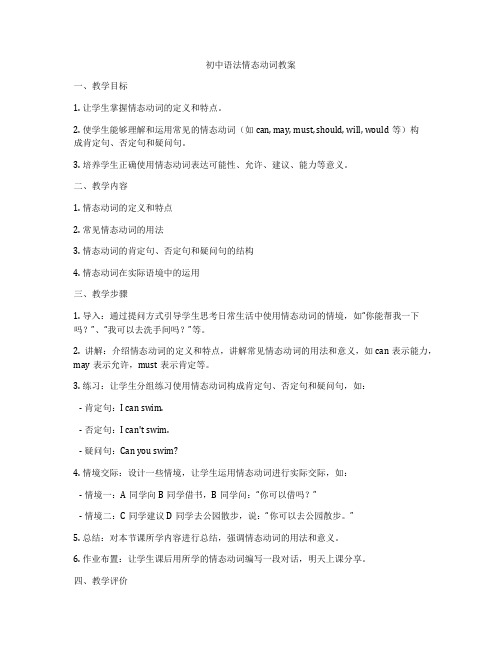
初中语法情态动词教案一、教学目标1. 让学生掌握情态动词的定义和特点。
2. 使学生能够理解和运用常见的情态动词(如can, may, must, should, will, would等)构成肯定句、否定句和疑问句。
3. 培养学生正确使用情态动词表达可能性、允许、建议、能力等意义。
二、教学内容1. 情态动词的定义和特点2. 常见情态动词的用法3. 情态动词的肯定句、否定句和疑问句的结构4. 情态动词在实际语境中的运用三、教学步骤1. 导入:通过提问方式引导学生思考日常生活中使用情态动词的情境,如“你能帮我一下吗?”、“我可以去洗手间吗?”等。
2. 讲解:介绍情态动词的定义和特点,讲解常见情态动词的用法和意义,如can表示能力,may表示允许,must表示肯定等。
3. 练习:让学生分组练习使用情态动词构成肯定句、否定句和疑问句,如:- 肯定句:I can swim.- 否定句:I can't swim.- 疑问句:Can you swim?4. 情境交际:设计一些情境,让学生运用情态动词进行实际交际,如:- 情境一:A同学向B同学借书,B同学问:“你可以借吗?”- 情境二:C同学建议D同学去公园散步,说:“你可以去公园散步。
”5. 总结:对本节课所学内容进行总结,强调情态动词的用法和意义。
6. 作业布置:让学生课后用所学的情态动词编写一段对话,明天上课分享。
四、教学评价1. 课堂参与度:观察学生在课堂上的积极参与情况和提问回答情况。
2. 练习正确性:检查学生在练习中使用情态动词的正确性。
3. 情境交际:评估学生在情境交际中运用情态动词的流畅性和准确性。
4. 作业完成情况:检查学生课后作业的完成质量和创新性。
通过以上教学设计,相信学生能够较好地掌握情态动词的用法,并在实际语境中灵活运用。
初中情态动词教案

初中情态动词教案课程目标:1. 学生能够理解情态动词的概念和用法。
2. 学生能够正确运用情态动词进行造句。
3. 学生能够区分不同情态动词的含义和用法。
教学内容:1. 情态动词的概念和分类。
2. 情态动词的用法和注意事项。
3. 练习和应用。
教学步骤:一、引入(5分钟)1. 向学生介绍情态动词的概念,让学生初步了解情态动词。
2. 提问学生,了解他们对情态动词的已有知识。
二、讲解(15分钟)1. 讲解情态动词的分类,如can, may, must, could, might, should等。
2. 举例解释每个情态动词的用法和含义。
3. 强调情态动词的用法和注意事项,如情态动词后面要跟动词原形,情态动词不能和助动词连用等。
三、练习(15分钟)1. 让学生分组,每组选择一个情态动词,用这个情态动词造句。
2. 让学生互相交换句子,并判断句子的正确性。
3. 让学生在班级内分享他们的句子,并解释为什么使用这个情态动词。
四、应用(15分钟)1. 让学生写一篇小短文,运用所学的不同情态动词。
2. 让学生互相交换短文,并进行评价和修改。
3. 让学生在班级内分享他们的短文,并解释他们为什么选择使用这些情态动词。
五、总结(5分钟)1. 对本节课的内容进行总结,让学生巩固所学知识。
2. 回答学生的疑问,并进行解答。
教学评价:1. 观察学生在练习中的表现,了解他们对于情态动词的掌握程度。
2. 评价学生在应用环节的短文,了解他们能否正确运用情态动词。
3. 收集学生的反馈意见,了解他们对情态动词的理解和运用情况。
教学反思:本节课通过讲解、练习和应用等环节,让学生掌握了情态动词的概念和用法。
在教学过程中,要注意让学生充分理解和掌握情态动词的用法,并能够正确运用情态动词进行造句。
同时,要注重学生的实际应用能力的培养,让他们能够在实际情境中灵活运用情态动词。
情态动词的基本作法教案

情态动词的基本用法教案一、教学目标1. 让学生掌握情态动词can, may, must, could, might, shall, will的基本用法。
2. 培养学生正确运用情态动词进行交际的能力。
3. 提高学生对英语语法和词汇的理解。
二、教学内容1. 情态动词can的基本用法:表示能力、允许、请求。
2. 情态动词may的基本用法:表示请求、允许、可能性。
3. 情态动词must的基本用法:表示必须、肯定、强制。
4. 情态动词could的基本用法:表示过去的能力、可能性、婉转的请求。
5. 情态动词might的基本用法:表示可能性、婉转的请求。
三、教学步骤1. 引入情态动词的概念,让学生了解情态动词的作用。
2. 通过例句和练习,讲解情态动词can, may, must, could, might的基本用法。
3. 进行小组活动,让学生互相练习使用情态动词进行交际。
4. 设计情景剧,让学生在角色扮演中运用情态动词。
5. 总结情态动词的用法,进行测试。
四、教学评估1. 观察学生在课堂上的参与度和积极性。
2. 评估学生在练习中的语法和词汇运用准确性。
3. 评价学生在角色扮演中的表现。
4. 分析测试结果,了解学生的掌握情况。
五、教学资源1. 情态动词的PPT演示。
2. 情态动词的例句和练习题。
3. 情景剧的角色扮演材料。
4. 测试题。
5. 录音机或音响设备,用于播放情景剧的音频。
六、教学扩展1. 引入其他情态动词如shall和will,解释它们在不同语境中的用法。
2. 通过例句和练习,让学生掌握shall和will的区别。
3. 进行小组活动,让学生在实际语境中运用shall和will。
七、课堂互动1. 设计问答环节,让学生用情态动词回答问题。
2. 进行情态动词的接龙游戏,激发学生的学习兴趣。
3. 组织学生进行情态动词的知识竞赛,增强学生的团队合作精神。
八、家庭作业1. 布置相关的练习题,让学生巩固情态动词的用法。
情态动词英语教案
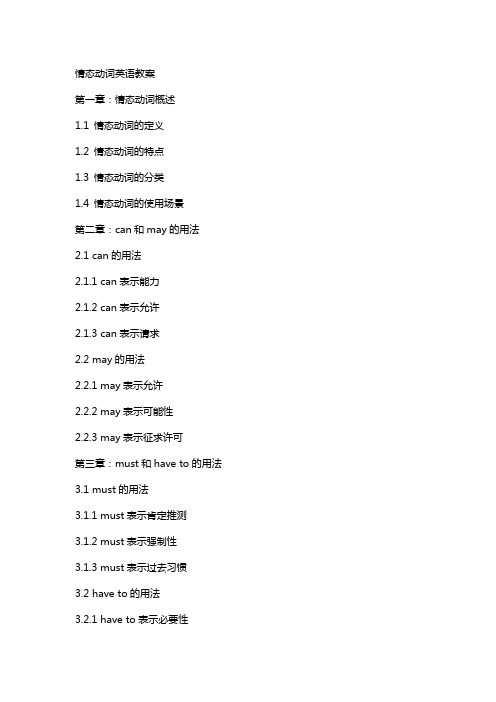
情态动词英语教案第一章:情态动词概述1.1 情态动词的定义1.2 情态动词的特点1.3 情态动词的分类1.4 情态动词的使用场景第二章:can和may的用法2.1 can的用法2.1.1 can表示能力2.1.2 can表示允许2.1.3 can表示请求2.2 may的用法2.2.1 may表示允许2.2.2 may表示可能性2.2.3 may表示征求许可第三章:must和have to的用法3.1 must的用法3.1.1 must表示肯定推测3.1.2 must表示强制性3.1.3 must表示过去习惯3.2 have to的用法3.2.1 have to表示必要性3.2.2 have to表示过去不得不3.2.3 have to表示将来不得不第四章:情态动词的否定句和疑问句4.1 情态动词的否定句4.1.1 构成方式4.1.2 否定句的用法4.2 情态动词的疑问句4.2.1 构成方式4.2.2 疑问句的用法第五章:情态动词的时态配合5.1 情态动词与一般现在时5.2 情态动词与一般过去时5.3 情态动词与一般将来时5.4 情态动词与现在进行时5.5 情态动词与过去进行时5.6 情态动词与现在完成时5.7 情态动词与过去完成时5.8 情态动词与将来完成时第六章:情态动词短语6.1 情态动词+动词原形6.2 情态动词+be+动词ing6.3 情态动词+have+过去分词6.4 情态动词+do/does/did+动词原形6.5 情态动词+would+动词原形第七章:情态动词的常用表达7.1 情态动词+not+动词原形7.2 情态动词+疑问词+动词原形7.3 情态动词+ever+动词原形7.4 情态动词+for+名词/代词+动词原形7.5 情态动词+不定式第八章:情态动词在特定场景中的应用8.1 情态动词在日常生活场景中的应用8.2 情态动词在工作场景中的应用8.3 情态动词在教育场景中的应用8.4 情态动词在社交场景中的应用8.5 情态动词在旅游场景中的应用第九章:情态动词的翻译技巧9.1 情态动词的直译9.2 情态动词的意译9.3 情态动词的转译9.4 情态动词的省略译9.5 情态动词的特殊译法第十章:情态动词的练习与巩固10.1 情态动词的选择题10.2 情态动词的填空题10.3 情态动词的翻译题10.4 情态动词的口语练习10.5 情态动词的综合练习第十一章:情态动词在阅读理解中的应用11.1 情态动词在阅读理解中的重要性11.2 情态动词在推理判断中的应用11.3 情态动词在事实细节查找中的应用11.4 情态动词在作者态度推断中的应用11.5 情态动词在阅读练习中的实际操作第十二章:情态动词在写作中的运用12.1 情态动词在写作中的作用12.2 情态动词在表达观点和态度中的应用12.3 情态动词在提出建议和请求中的应用12.4 情态动词在叙述过去事件中的应用12.5 情态动词在写作练习中的实际操作第十三章:情态动词在听力理解中的应用13.1 情态动词在听力理解中的重要性13.2 情态动词在理解说话者意图中的应用13.3 情态动词在捕捉关键信息中的应用13.4 情态动词在对话情境理解中的应用13.5 情态动词在听力练习中的实际操作第十四章:情态动词在口语交流中的应用14.1 情态动词在口语交流中的重要性14.2 情态动词在表达可能性中的应用14.3 情态动词在表达意愿和决心中的应用14.4 情态动词在提出问题和回答中的应用14.5 情态动词在口语交流练习中的实际操作第十五章:情态动词的测试与评估15.1 情态动词的测试类型15.2 情态动词的测试题型15.3 情态动词的评估标准15.4 情态动词的自我评估15.5 情态动词的提升策略重点和难点解析本文主要介绍了情态动词的基本概念、用法、语法规则、实际应用场景、练习与测试等各个方面。
情态动词教案

情态动词教案一、教学目标1. 理解情态动词的意义和用法,包括能力、权限、可能性、推测、建议等。
2. 掌握常见的情态动词,如can, could, may, might, must, should等的用法。
3. 能够正确运用情态动词来表达不同的语义。
4. 通过练习提高运用情态动词的能力。
二、教学准备1. 教师准备:课件、教材、白板、笔等。
2. 学生准备:课本、笔、笔记本等。
三、教学步骤1. 导入(5分钟)引导学生回顾动词的基本概念和运用,为学习情态动词做铺垫。
2. 介绍情态动词(10分钟)通过示意图和简短的解释,向学生介绍情态动词的定义和基本特点。
3. 情态动词的用法(15分钟)通过多个例句,讲解情态动词的不同用法,如表示能力、权限、可能性、推测和建议等。
4. 常用情态动词的用法(15分钟)介绍几个常用的情态动词,如can, could, may, might, must, should等,并给出相应的例句和用法解释。
5. 情态动词的练习(15分钟)让学生完成一些练习题,巩固对情态动词的掌握程度,同时培养运用情态动词的能力。
6. 情态动词的拓展运用(10分钟)鼓励学生在课堂上提出更多的例句和情态动词的用法,并进行讨论和分享。
7. 总结与评价(5分钟)总结本节课所学的内容,检查学生对情态动词的掌握情况。
四、课堂讨论在课堂上,教师可与学生进行互动性的讨论,如让学生用所学的情态动词来回答教师的问题,或者通过小组合作讨论,从不同的角度探讨情态动词的用法和意义。
五、拓展练习1. 在课堂上让学生完成一些情态动词的练习题,以培养他们的运用能力。
2. 布置一些家庭作业,要求学生写一篇文章,并在文章中运用情态动词来表达不同的意义和语境。
六、教学反思通过本节课的教学,学生能够理解情态动词的用法和意义,形成初步的运用能力。
在教学过程中,教师要注意引导学生主动思考、互动讨论,以巩固学生对情态动词的理解和应用。
此外,针对不同水平的学生,可以适当调整教学内容和难易程度,确保每个学生都能够受益于这堂课。
初中英语情态动词教案

初中英语情态动词教案【教学内容】情态动词【教学目标】1. 理解什么是情态动词及其用法。
2. 能正确使用情态动词来表示能力、允许、请求等。
3. 能够区分不同情态动词的含义和用法。
4. 能够根据具体场景运用情态动词进行口语表达。
【教学重点】1. 引导学生理解并掌握常见的情态动词及其用法。
2. 培养学生灵活运用情态动词的能力。
3. 培养学生的口语表达能力。
【教学难点】1. 准确理解和运用情态动词的不同含义和用法。
2. 分辨情态动词与其他动词的区别。
3. 运用情态动词进行口语表达。
【教学准备】教学课件、练习册、录音机、多媒体设备等。
【教学过程】一、导入新课(15分钟)1. Greetings and warm-up: 教师与学生互相问候,进行热身。
2. Review: 复习上一节学过的动词的基本用法,介绍情态动词的概念。
二、展示与讲解(25分钟)1. 展示课件,向学生介绍情态动词的定义和用法。
2. 向学生展示几个常见的情态动词及其用法,如 can, could, may。
3. 通过例句和实际情境讲解不同情态动词的含义和用法。
4. 提醒学生情态动词在句子中的位置和变化规律。
三、练习与互动(30分钟)1. 各种练习形式:例题训练、小组活动、对话练习等,旨在巩固学生对情态动词的理解和运用能力。
2. 让学生根据情境完成对话,使用正确的情态动词。
3. 进行小组活动,让学生为某个特定情况选择合适的情态动词,并进行口语表达。
四、总结归纳(10分钟)1. 总结情态动词的定义和用法。
2. 确认学生对情态动词的理解程度。
3. 解答学生提出的问题。
五、作业布置(5分钟)1. 布置相关练习:书面练习或课外作业。
2. 提醒学生留意身边的语言表达,特别是涉及到能力、允许、请求等方面的情态动词的使用。
【教学拓展】本节课只是对初中英语情态动词的简单介绍,针对初中学生的语法水平和学习能力,教师可以根据实际情况进行适当的调整和拓展。
1. 情态动词的否定形式及缩略形式。
(完整版)情态动词教案
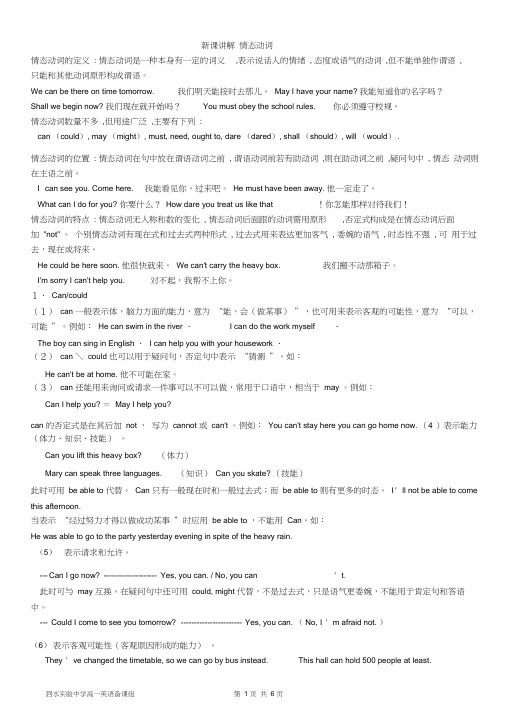
新课讲解情态动词情态动词的定义: 情态动词是一种本身有一定的词义,表示说话人的情绪, 态度或语气的动词,但不能单独作谓语,只能和其他动词原形构成谓语。
We can be there on time tomorrow. 我们明天能按时去那儿。
May I have your name? 我能知道你的名字吗?Shall we begin now? 我们现在就开始吗?You must obey the school rules. 你必须遵守校规。
情态动词数量不多,但用途广泛,主要有下列:can (could), may (might), must, need, ought to, dare (dared), shall (should), will (would) .情态动词的位置: 情态动词在句中放在谓语动词之前, 谓语动词前若有助动词,则在助动词之前,疑问句中, 情态动词则在主语之前。
I can see you. Come here. 我能看见你,过来吧。
He must have been away. 他一定走了。
What can I do for you? 你要什么?How dare you treat us like that !你怎能那样对待我们!情态动词的特点: 情态动词无人称和数的变化, 情态动词后面跟的动词需用原形,否定式构成是在情态动词后面加"not" 。
个别情态动词有现在式和过去式两种形式, 过去式用来表达更加客气, 委婉的语气, 时态性不强, 可用于过去,现在或将来。
He could be here soon. 他很快就来。
We can't carry the heavy box. 我们搬不动那箱子。
I'm sorry I can't help you. 对不起,我帮不上你。
1.Can/could(1)can 一般表示体,脑力方面的能力,意为“能,会(做某事)”,也可用来表示客观的可能性,意为“可以,可能”。
情态动词的基本作法教案

情态动词的基本用法教案一、教学目标1. 让学生掌握情态动词的基本用法,包括can, may, must, could, might, should等。
2. 培养学生正确运用情态动词进行交际的能力。
3. 提高学生对英语语法和词汇的理解。
二、教学内容1. 情态动词can的基本用法。
2. 情态动词may的基本用法。
3. 情态动词must的基本用法。
4. 情态动词could的基本用法。
5. 情态动词might的基本用法。
6. 情态动词should的基本用法。
三、教学方法1. 采用任务型教学法,通过小组合作、角色扮演等形式,让学生在实际语境中运用情态动词。
2. 运用情境教学法,创设各种真实情境,引导学生正确使用情态动词。
3. 采用语法讲解与练习相结合的方法,帮助学生掌握情态动词的用法。
四、教学步骤1. 引入情态动词的概念,让学生初步了解情态动词的作用。
2. 讲解情态动词can的用法,并通过例句和练习让学生加以巩固。
3. 讲解情态动词may的用法,并与can进行对比,让学生区分它们的用法。
4. 讲解情态动词must的用法,特别强调其表示推测和强制性的特点。
5. 讲解情态动词could的用法,并与may进行对比,让学生了解它们的区别。
五、作业与评价1. 作业:让学生运用所学的情态动词完成一个简短的故事或对话。
2. 评价:通过课堂表现、作业完成情况和小组合作等形式,对学生的学习效果进行评价。
教学反思:在教学过程中,要注意关注学生的学习情况,及时解答他们的疑问。
针对不同学生的学习水平,可以适当调整教学内容和难度。
通过多样化的教学活动,激发学生的学习兴趣,提高他们的参与度。
在评价环节,要注重学生的全面发展,既要关注他们的语法知识,也要关注他们的交际能力。
六、教学内容1. 情态动词should的用法,包括其表示建议、责任和建议的用法。
2. 情态动词need的用法,区分其作为情态动词和实义动词的不同用法。
3. 情态动词have to的用法,强调其表示必要性和被迫性的特点。
初中情态动词的教案

初中情态动词的教案一、教学目标:1. 让学生掌握常见的情态动词,如can, may, must, could, might, should等。
2. 使学生能够正确运用情态动词提问和回答,表达可能性、允许、建议、能力等意义。
3. 培养学生运用情态动词进行交际的能力,提高学生的英语口语水平。
二、教学内容:1. 情态动词的定义和用法。
2. 情态动词的提问和回答方式。
3. 情态动词在实际语境中的应用。
三、教学过程:1. 导入:通过一幅图片或情景,引导学生思考情态动词的用法。
2. 讲解:讲解情态动词的定义和用法,举例说明。
3. 练习:让学生进行情态动词的提问和回答练习,巩固所学知识。
4. 应用:创设实际语境,让学生运用情态动词进行交际。
5. 总结:对本节课的内容进行总结,强调情态动词的重要性和用法。
四、教学方法:1. 情境教学法:通过创设实际语境,让学生在情境中学习情态动词的用法。
2. 互动教学法:引导学生进行提问和回答练习,提高学生的口语表达能力。
3. 交际教学法:鼓励学生在实际交际中运用情态动词,提高学生的交际能力。
五、教学评价:1. 课堂参与度:观察学生在课堂上的积极参与情况和表现。
2. 练习正确性:检查学生在练习中的答案是否正确。
3. 实际应用:评价学生在实际语境中运用情态动词的能力。
4. 口语表达:评估学生在口语交际中的表现,如提问、回答等。
六、教学资源:1. 图片或情景:用于导入和创设实际语境。
2. 练习题:用于巩固所学知识,提高学生的应用能力。
3. 录音机或音响:用于播放录音,提高学生的听力水平。
4. 教学课件:用于辅助讲解和展示教学内容。
七、教学步骤:1. 导入:展示一幅图片或情景,引导学生思考情态动词的用法。
2. 讲解:讲解情态动词的定义和用法,举例说明。
3. 练习:让学生进行情态动词的提问和回答练习。
4. 应用:创设实际语境,让学生运用情态动词进行交际。
5. 总结:对本节课的内容进行总结,强调情态动词的重要性和用法。
中考英语 情态动词复习教案(表格式)

中考英语情态动词复习教案(表格式)一、教学目标:1. 掌握常见的情态动词,包括can, may, must, could, might, shall, will等。
2. 学会区分情态动词的用法,如表能力、可能性、建议、命令等。
3. 能够正确运用情态动词构造句子,表达推测、请求、承诺等意义。
二、教学重难点:1. 情态动词的辨析及用法。
2. 情态动词在特定语境中的运用。
三、教学方法:1. 任务型教学法:通过完成各种任务,让学生在实际运用中掌握情态动词的用法。
2. 互动式教学法:引导学生进行小组讨论、pr work等,提高学生的参与度和积极性。
四、教学准备:1. PPT课件:情态动词表格式教案。
2. 练习题:针对不同情境的填空、选择、改写等练习。
五、教学过程:1. 导入:以一段对话或故事引入情态动词,激发学生的兴趣。
2. 呈现:通过PPT展示情态动词表格式教案,引导学生观察和思考。
3. 讲解:讲解每个情态动词的用法,举例说明。
4. 练习:让学生完成PPT上的练习题,巩固所学知识。
5. 小组讨论:学生分组,讨论如何运用情态动词描述certn situations。
6. 分享:每组选代表分享讨论成果,大家互相评价、学习。
7. 总结:教师对情态动词的用法进行归纳总结。
8. 作业布置:布置针对性的练习题,让学生课后巩固。
9. 课后反馈:收集学生的作业,及时给予反馈和指导。
10. 课程拓展:引导学生关注情态动词在实际生活中的应用,提高语言运用能力。
六、教学评价:1. 课堂参与度:观察学生在课堂上的发言和互动情况,评估他们的积极参与程度。
2. 练习完成情况:检查学生完成的练习题,评估他们对情态动词用法的掌握程度。
3. 小组讨论:评估学生在小组讨论中的表现,包括他们的合作能力和语言表达能力。
七、教学拓展:1. 举办情态动词角色扮演活动:让学生在具体情境中运用情态动词,提高他们的实际运用能力。
2. 观看相关视频或阅读文章:通过视频或文章,让学生进一步了解情态动词在实际语境中的运用。
情态动词can的教学教案

情态动词can的教学教案第一章:情态动词can的概述1.1 情态动词can的定义解释情态动词can的含义和用法强调情态动词can表示能力、允许和请求的能力1.2 情态动词can与其他情态动词的区别对比情态动词can与其他常见情态动词如may, must, should等分析不同情态动词的用法和含义第二章:情态动词can表示能力2.1 情态动词can表示能力的结构介绍情态动词can表示能力的肯定句和否定句结构举例说明如何使用情态动词can表示能力2.2 情态动词can表示能力的实际应用通过情境练习,让学生学会使用情态动词can表示能力提供例句和练习题,巩固学生对情态动词can表示能力的掌握第三章:情态动词can表示允许3.1 情态动词can表示允许的结构介绍情态动词can表示允许的肯定句和否定句结构举例说明如何使用情态动词can表示允许3.2 情态动词can表示允许的实际应用通过情境练习,让学生学会使用情态动词can表示允许提供例句和练习题,巩固学生对情态动词can表示允许的掌握第四章:情态动词can表示请求4.1 情态动词can表示请求的结构介绍情态动词can表示请求的肯定句和否定句结构举例说明如何使用情态动词can表示请求4.2 情态动词can表示请求的实际应用通过情境练习,让学生学会使用情态动词can表示请求提供例句和练习题,巩固学生对情态动词can表示请求的掌握第五章:情态动词can的复习和拓展5.1 情态动词can的复习通过练习题和游戏,复习情态动词can的用法检测学生对情态动词can的掌握程度5.2 情态动词can的拓展介绍情态动词can的其他用法,如用于提供帮助、表达可能性等提供相关练习题,帮助学生拓展情态动词can的用法第六章:情态动词can的否定句6.1 情态动词can的否定句结构解释情态动词can的否定句结构,即“主语+ can't + 动词原形”强调情态动词can的否定句表示能力、允许和请求的否定6.2 情态动词can的否定句实际应用通过情境练习,让学生学会使用情态动词can的否定句提供例句和练习题,巩固学生对情态动词can的否定句的掌握第七章:情态动词can的疑问句7.1 情态动词can的疑问句结构解释情态动词can的疑问句结构,即“Can + 主语+ 动词原形?”强调情态动词can的疑问句用于询问能力、允许和请求7.2 情态动词can的疑问句实际应用通过情境练习,让学生学会使用情态动词can的疑问句提供例句和练习题,巩固学生对情态动词can的疑问句的掌握第八章:情态动词can的语法规则8.1 情态动词can的时态介绍情态动词can与不态的结合使用,如现在时、过去时和将来时举例说明情态动词can的时态变化规则8.2 情态动词can的主语强调情态动词can后的主语必须是人提供练习题,让学生学会正确使用情态动词can的主语第九章:情态动词can的综合练习9.1 情态动词can的混合练习提供含有情态动词can的混合练习题,包括肯定句、否定句和疑问句通过练习题,巩固学生对情态动词can的用法9.2 情态动词can的角色扮演分组进行角色扮演,让学生在实际情境中运用情态动词can鼓励学生大胆表达,提高口语能力第十章:情态动词can的拓展学习10.1 情态动词can的近义词介绍情态动词can的近义词,如be able to, may等举例说明如何使用这些近义词替换情态动词can10.2 情态动词can的交际场景介绍情态动词can在日常生活和社交场合中的常见用法提供相关练习题,帮助学生学会在实际场景中运用情态动词can第十一章:情态动词can的被动语态11.1 情态动词can的被动语态结构解释情态动词can的被动语态结构,即“主语+ be + 过去分词+ can + 动词原形?”强调情态动词can的被动语态用于描述能力、允许和请求的被动情况11.2 情态动词can的被动语态实际应用通过情境练习,让学生学会使用情态动词can的被动语态提供例句和练习题,巩固学生对情态动词can的被动语态的掌握第十二章:情态动词can的错误纠正12.1 情态动词can的常见错误分析学生在使用情态动词can时常见的错误,如时态错误、主语错误等提供正确的例句和解释,帮助学生纠正错误12.2 情态动词can的错误纠正练习提供含有错误的情态动词can的句子,让学生进行纠正练习通过练习题,帮助学生提高正确使用情态动词can的能力第十三章:情态动词can的同义词和反义词13.1 情态动词can的同义词介绍情态动词can的同义词,如be able to, may等举例说明如何使用这些同义词替换情态动词can13.2 情态动词can的反义词介绍情态动词can的反义词,如can't, might not等举例说明如何使用这些反义词表达相反的意思第十四章:情态动词can的综合应用14.1 情态动词can的故事创作让学生创作一个包含情态动词can的故事,要求故事情节丰富,角色生动通过故事创作,提高学生对情态动词can的综合应用能力14.2 情态动词can的口头报告要求学生准备一个关于情态动词can的口头报告,包括情态动词can 的定义、用法、例句等通过口头报告,提高学生的表达和沟通能力第十五章:情态动词can的复习和测试15.1 情态动词can的复习通过练习题和游戏,复习情态动词can的用法检测学生对情态动词can的掌握程度15.2 情态动词can的测试提供一份情态动词can的测试题,包括选择题、填空题和句子完成题通过测试,评估学生对情态动词can的掌握情况,为后续教学提供参考重点和难点解析重点:1. 情态动词can的定义和用法;2. 情态动词can表示能力、允许和请求的结构及实际应用;3. 情态动词can的否定句和疑问句结构及实际应用;4. 情态动词can的时态和主语的用法;5. 情态动词can的被动语态结构及实际应用;6. 情态动词can的同义词、反义词和拓展用法。
英语语法教学微课教案(情态动词can和could)

英语语法教学微课教案(情态动词can和could)一、教学目标1. 让学生掌握情态动词can和could的用法。
2. 培养学生运用情态动词进行日常交流的能力。
3. 提高学生对英语语法的兴趣和自信心。
二、教学内容1. can和could的基本用法。
2. can和could在不同情境下的应用。
3. 练习和巩固所学知识。
三、教学重点与难点1. 重点:can和could的用法及区别。
2. 难点:如何正确运用can和could进行日常交流。
四、教学方法1. 情境教学法:通过设定不同的情境,让学生在实际语境中学习、理解和运用can和could。
2. 任务型教学法:通过完成各种任务,培养学生的实际运用能力。
3. 互动式教学法:鼓励学生积极参与,提高课堂氛围。
五、教学过程1. 引入:通过一个简单的日常交流场景,引导学生思考情态动词的作用。
2. 讲解:讲解can和could的基本用法,并举例说明。
3. 练习:让学生进行小组练习,运用can和could进行交流。
4. 情境模拟:设置不同情境,让学生扮演角色,运用can和could 进行对话。
5. 任务完成:让学生分组完成一项任务,如编写一个小故事,运用can和could。
6. 总结与反馈:对学生的表现进行点评,指出优点和不足,鼓励学生继续努力。
7. 拓展练习:布置课后作业,让学生进一步巩固所学知识。
8. 课堂小结:总结本节课的主要内容,强调can和could的用法及区别。
9. 课后反思:教师对本节课的教学效果进行反思,为下一节课做好准备。
六、教学评价1. 学生能熟练运用can和could进行日常交流。
2. 学生能正确完成相关练习和任务。
3. 学生对英语语法的兴趣和自信心有所提高。
七、教学资源1. PPT课件:展示can和could的用法及例句。
2. 情境模拟道具:如图片、卡片等。
3. 小组活动材料:如故事编写模板、任务清单等。
八、教学步骤1. 引入:通过一个简单的日常交流场景,引导学生思考情态动词的作用。
初中英语情态动词教案

初中英语情态动词教案一、教学目标:1. 了解情态动词的概念及基本用法;2. 学习情态动词 can 的用法,能够正确运用 can 表示能力;3. 学习情态动词 must 的用法,能够运用 must 表示推测和必要性;4. 学习情态动词 should 的用法,能够正确运用 should 表示建议和义务;5. 学习情态动词的否定形式和疑问形式,能够准确运用情态动词完成肯定、否定和疑问句。
二、教学重点与难点:1. 情态动词 can、must 和 should 的基本用法;2. 能够准确运用情态动词完成各种句子形式。
三、教学准备:教学课件、教学录像、黑板、白板、课本、练习题等。
四、教学过程:1. 热身导入教师可通过呈现有关能力、推测和建议的场景图片或视频,引导学生进行讨论,激发学生对情态动词的兴趣。
2. 新知呈现教师通过幻灯片或课件介绍情态动词的概念,并列举出常见的情态动词有 can、must 和 should。
让学生跟读例句,感受情态动词的用法和特点。
3. 情态动词 can 的用法讲解和练习(1)教师讲解 can 的基本用法,如表示能力和允许等。
并给予学生示范运用 can 表达能力的练习。
(2)教师板书 can 的肯定、否定形式和疑问形式,并给学生解释其构成和用法,要求学生在小组内互相练习,并展示出来。
4. 情态动词 must 的用法讲解和练习(1)教师讲解 must 表示推测和必要性的用法,并给予学生相关练习。
(2)教师引导学生用must 结合实际情景进行情态动词的运用练习。
5. 情态动词 should 的用法讲解和练习(1)教师讲解 should 表示建议和义务的用法,并给予学生相关练习。
(2)教师组织学生分角色进行对话练习,使学生能够正确表达建议和义务。
6. 情态动词的综合运用教师呈现一段对话或短文,让学生在课堂上进行整体理解,并根据问题回答、补全短文等活动,以提高学生对情态动词的综合运用能力。
7. 拓展延伸(1)教师可通过提问或让学生表演等形式,进一步巩固学生对情态动词的理解。
情态动词的基本作法教案
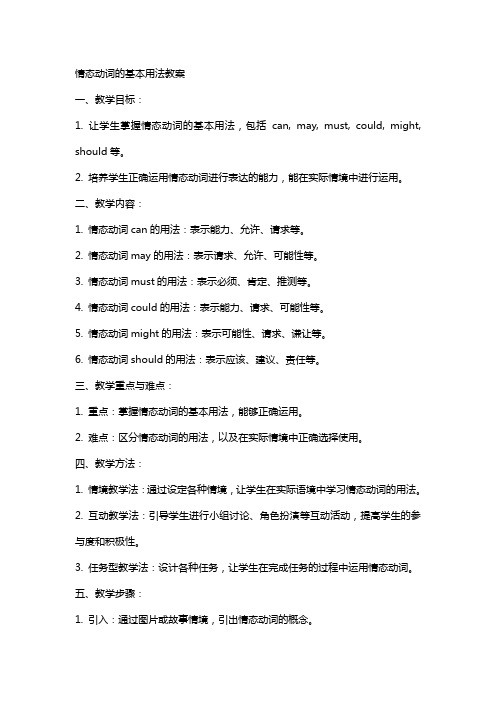
情态动词的基本用法教案一、教学目标:1. 让学生掌握情态动词的基本用法,包括can, may, must, could, might, should等。
2. 培养学生正确运用情态动词进行表达的能力,能在实际情境中进行运用。
二、教学内容:1. 情态动词can的用法:表示能力、允许、请求等。
2. 情态动词may的用法:表示请求、允许、可能性等。
3. 情态动词must的用法:表示必须、肯定、推测等。
4. 情态动词could的用法:表示能力、请求、可能性等。
5. 情态动词might的用法:表示可能性、请求、谦让等。
6. 情态动词should的用法:表示应该、建议、责任等。
三、教学重点与难点:1. 重点:掌握情态动词的基本用法,能够正确运用。
2. 难点:区分情态动词的用法,以及在实际情境中正确选择使用。
四、教学方法:1. 情境教学法:通过设定各种情境,让学生在实际语境中学习情态动词的用法。
2. 互动教学法:引导学生进行小组讨论、角色扮演等互动活动,提高学生的参与度和积极性。
3. 任务型教学法:设计各种任务,让学生在完成任务的过程中运用情态动词。
五、教学步骤:1. 引入:通过图片或故事情境,引出情态动词的概念。
2. 讲解:讲解情态动词的基本用法,举例说明。
3. 练习:设计各种练习题,让学生进行巩固练习。
4. 互动活动:组织学生进行小组讨论、角色扮演等互动活动,运用情态动词。
5. 任务:设计实际任务,让学生在完成任务的过程中运用情态动词。
7. 作业布置:布置相关作业,让学生巩固所学知识。
六、教学评价:1. 课堂参与度:观察学生在课堂上的积极参与程度,包括发言、讨论、表演等。
2. 练习完成情况:检查学生完成练习的情况,包括答案的正确性和书写的规范性。
3. 任务完成情况:评价学生在完成任务过程中的表现,包括情态动词的运用准确性、沟通流畅性等。
4. 作业完成情况:审阅学生作业,评估情态动词用法的掌握程度。
5. 学生自评与互评:鼓励学生进行自我评价和同伴评价,以提高自我意识和团队协作能力。
《情态动词》的用法教案
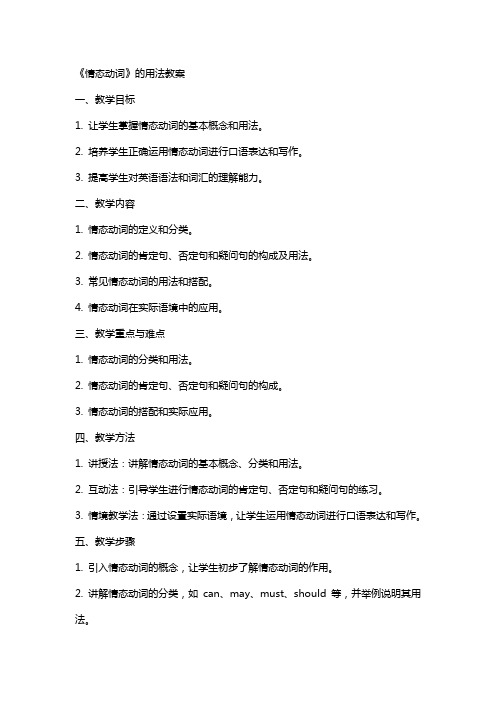
《情态动词》的用法教案一、教学目标1. 让学生掌握情态动词的基本概念和用法。
2. 培养学生正确运用情态动词进行口语表达和写作。
3. 提高学生对英语语法和词汇的理解能力。
二、教学内容1. 情态动词的定义和分类。
2. 情态动词的肯定句、否定句和疑问句的构成及用法。
3. 常见情态动词的用法和搭配。
4. 情态动词在实际语境中的应用。
三、教学重点与难点1. 情态动词的分类和用法。
2. 情态动词的肯定句、否定句和疑问句的构成。
3. 情态动词的搭配和实际应用。
四、教学方法1. 讲授法:讲解情态动词的基本概念、分类和用法。
2. 互动法:引导学生进行情态动词的肯定句、否定句和疑问句的练习。
3. 情境教学法:通过设置实际语境,让学生运用情态动词进行口语表达和写作。
五、教学步骤1. 引入情态动词的概念,让学生初步了解情态动词的作用。
2. 讲解情态动词的分类,如can、may、must、should等,并举例说明其用法。
3. 引导学生学习情态动词的肯定句、否定句和疑问句的构成,进行相关练习。
4. 讲解情态动词的搭配,如“be able to”、“have to”等,并让学生进行实际运用。
5. 通过设置实际语境,让学生运用情态动词进行口语表达和写作,提高实际应用能力。
六、教学评估1. 课堂练习:设计一些关于情态动词的练习题,包括选择题、填空题和句子完成题,以巩固所学知识。
2. 小组讨论:让学生分组讨论情态动词在实际生活中的应用,选取小组代表进行分享。
3. 口语表达:组织学生进行情景对话,运用情态动词进行口语表达,评估学生的口语运用能力。
七、课后作业1. 让学生结合所学内容,编写一篇小作文,运用情态动词表达自己的观点和看法。
2. 完成课后练习册的相关题目,加深对情态动词用法的理解。
3. 搜集情态动词的实际应用例句,进行分享和交流。
八、拓展活动1. 举办情态动词知识竞赛,激发学生学习兴趣,巩固所学知识。
2. 组织学生进行情态动词的主题演讲,提高学生的口语表达能力和自信心。
情态动词的基本作法教案

情态动词的基本用法教案一、教学目标1. 让学生掌握情态动词can, may, must, could, might, should 的基本用法。
2. 培养学生运用情态动词进行日常交流的能力。
3. 提高学生对英语语法和词汇的理解。
二、教学内容1. 情态动词can 的用法:表示能力、允许、请求、可能性等。
2. 情态动词may 的用法:表示请求、允许、可能性等。
3. 情态动词must 的用法:表示肯定、必须、推测等。
4. 情态动词could 的用法:表示过去的能力、请求、可能性等。
5. 情态动词might 的用法:表示可能性、请求、谦让等。
6. 情态动词should 的用法:表示应该、建议、可能性等。
三、教学重点与难点1. 重点:掌握情态动词can, may, must, could, might, should 的基本用法。
2. 难点:区分情态动词之间的用法和搭配,以及在不同语境中的运用。
四、教学方法1. 任务型教学法:通过小组讨论、角色扮演等任务,让学生在实际语境中运用情态动词。
2. 情境教学法:创设各种真实的情境,让学生在实践中学会使用情态动词。
3. 互动式教学法:引导学生积极参与课堂活动,提高课堂氛围,增强学生的学习兴趣。
五、教学步骤1. 导入:以一段对话引入情态动词的概念,激发学生的学习兴趣。
2. 讲解:分别讲解情态动词can, may, must, could, might, should 的基本用法。
3. 练习:设计不同情境的练习题,让学生运用所学情态动词进行回答。
4. 小组讨论:让学生分组讨论情态动词在不同情境下的用法,分享学习心得。
5. 角色扮演:分组进行角色扮演,模拟真实场景,运用情态动词进行交流。
6. 总结:对本节课所学内容进行总结,强调情态动词的用法和搭配。
7. 作业:布置相关练习题,巩固所学知识。
六、教学评估1. 课堂练习:观察学生在练习中的表现,了解他们对于情态动词用法的掌握情况。
初中英语情态动词教案
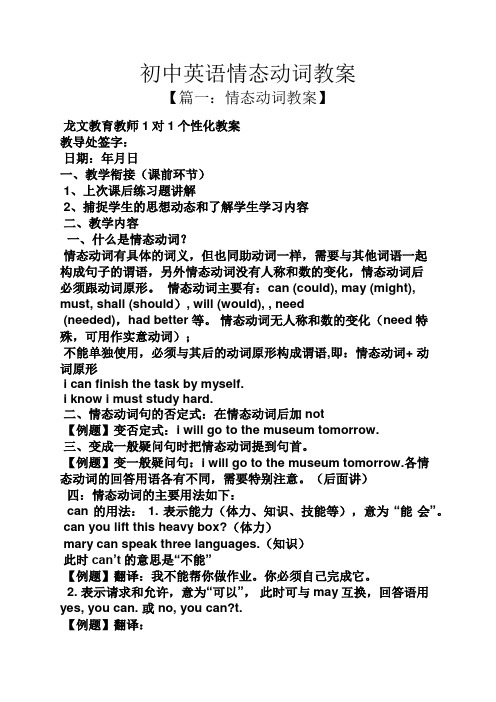
初中英语情态动词教案【篇一:情态动词教案】龙文教育教师1对1个性化教案教导处签字:日期:年月日一、教学衔接(课前环节)1、上次课后练习题讲解2、捕捉学生的思想动态和了解学生学习内容二、教学内容一、什么是情态动词?情态动词有具体的词义,但也同助动词一样,需要与其他词语一起构成句子的谓语,另外情态动词没有人称和数的变化,情态动词后必须跟动词原形。
情态动词主要有:can (could), may (might), must, shall (should), will (would), , need(needed),had better等。
情态动词无人称和数的变化(need特殊,可用作实意动词);不能单独使用,必须与其后的动词原形构成谓语,即:情态动词+ 动词原形i can finish the task by myself.i know i must study hard.二、情态动词句的否定式:在情态动词后加not【例题】变否定式:i will go to the museum tomorrow.三、变成一般疑问句时把情态动词提到句首。
【例题】变一般疑问句:i will go to the museum tomorrow.各情态动词的回答用语各有不同,需要特别注意。
(后面讲)四:情态动词的主要用法如下:can 的用法: 1. 表示能力(体力、知识、技能等),意为“能会”。
can you lift this heavy box?(体力)mary can speak three languages.(知识)此时can’t的意思是“不能”【例题】翻译:我不能帮你做作业。
你必须自己完成它。
2. 表示请求和允许,意为“可以”,此时可与may互换,回答语用yes, you can. 或 no, you can?t.【例题】翻译:——我现在可以走吗?——是的,你可以(走了)/ 不行,你不能 (走)。
could的用法:1. can的过去式,意为“能、会”,表示过去的能力。
- 1、下载文档前请自行甄别文档内容的完整性,平台不提供额外的编辑、内容补充、找答案等附加服务。
- 2、"仅部分预览"的文档,不可在线预览部分如存在完整性等问题,可反馈申请退款(可完整预览的文档不适用该条件!)。
- 3、如文档侵犯您的权益,请联系客服反馈,我们会尽快为您处理(人工客服工作时间:9:00-18:30)。
新课讲解情态动词情态动词的定义: 情态动词是一种本身有一定的词义,表示说话人的情绪,态度或语气的动词,但不能单独作谓语, 只能和其他动词原形构成谓语。
We can be there on time tomorrow. 我们明天能按时去那儿。
May I have your name? 我能知道你的名字吗?Shall we begin now? 我们现在就开始吗?You must obey the school rules.你必须遵守校规。
情态动词数量不多,但用途广泛,主要有下列: can (could), may (might), must, need, ought to, dare (dared), shall (should), will (would) .情态动词的位置: 情态动词在句中放在谓语动词之前, 谓语动词前若有助动词,则在助动词之前,疑问句中, 情态动词则在主语之前。
I can see you. Come here. 我能看见你,过来吧。
He must have been away.他一定走了。
What can I do for you? 你要什么?How dare you treat us like that!你怎能那样对待我们!情态动词的特点: 情态动词无人称和数的变化, 情态动词后面跟的动词需用原形,否定式构成是在情态动词后面加"not"。
个别情态动词有现在式和过去式两种形式, 过去式用来表达更加客气, 委婉的语气, 时态性不强, 可用于过去,现在或将来。
He could be here soon. 他很快就来。
We can't carry the heavy box. 我们搬不动那箱子。
I'm sorry I can't help you. 对不起,我帮不上你。
1.Can/could(1)can 一般表示体,脑力方面的能力,意为“能,会(做某事)”,也可用来表示客观的可能性,意为“可以,可能”。
例如:He can swim in the river.I can do the work myself.The boy can sing in English.I can help you with your housework.(2)can \could 也可以用于疑问句,否定句中表示“猜测”。
如:He can't be at home.他不可能在家。
(3)can还能用来询问或请求一件事可以不可以做,常用于口语中,相当于may。
例如:Can I help you? =May I help you?can 的否定式是在其后加not,写为cannot 或can't。
例如:You can't stay here you can go home now.(4)表示能力(体力、知识、技能)。
Can you lift this heavy box?(体力)Mary can speak three languages.(知识)Can you skate?(技能)此时可用be able to代替。
Can只有一般现在时和一般过去式;而be able to则有更多的时态。
I’ll not be able to come this afternoon.当表示“经过努力才得以做成功某事”时应用be able to,不能用Can。
如:He was able to go to the party yesterday evening in spite of the heavy rain.(5)表示请求和允许。
-----Can I go now? ----- Yes, you can. / No, you can’t.此时可与may互换。
在疑问句中还可用could,might代替,不是过去式,只是语气更委婉,不能用于肯定句和答语中。
---- Could I come to see you tomorrow? ---- Yes, you can. ( No, I’m afraid not. )(6)表示客观可能性(客观原因形成的能力)。
They’ve changed the timetable, so we can go by bus instead. This hall can hold 500 people at least.(7)表示推测(惊讶、怀疑、不相信的态度),用于疑问句、否定句和感叹句中。
Can this be true? This can’t be done by him. How can this be true?2.May/ Might(1)may一般表示“请求,许可,允许”。
例如:—May I come in﹖—Come in please.—May I go home now﹖—Yes, you may.You may only keep the books for two weeks.这些书你只可以借两个星期。
(2)may可以用来表示“猜测,推测”。
例如:Our head teacher may be in the office.我们的班主任可能在办公室。
(3)may还能用来表示“希望,祝愿,渴望,请求和应该”。
用于祈使句,表示祝愿。
例如:May you be happy!祝你幸福!May you succeed!(4)表示请求和允许。
might比may语气更委婉,而不是过去式。
否定回答时可用can’t或mustn’t,表示“不可以,禁止”。
----Might/ May I smoke in this room? ---- No, you mustn’t.---- May/Might I take this book out of the room? ---- Yes, you can. (No, you can’t / mustn’t. )用May I...?征徇对方许可时比较正式和客气,而用Can I...?在口语中更常见。
表示推测、可能性(不用于疑问句)。
might不是过去式,它所表示的可能性比may小。
He may /might be very busy now. Your mother may /might not know the truth.3.Must/ have to(1)must表示义务,禁止和推测,意思是“必须,应该,应当,一定是,务必要”等。
例如:I must do my homework at once.We must speak more English.You must help each other.It's ten now my mother must be angry.(2)在回答must的疑问句时,其否定形式多用needn't来表示“没必要,不许”。
例如:—Must she answer the question in English﹖—No, she needn't.注意:mustn't 经常表示绝对禁止,语气强烈。
如:You mustn't do it again.你再也不能这样做了。
(3)must在表示猜测,推测时,否定式常用can't代替。
例如:The students of Class Three must be having a good time in the park.三班的学生一定在公园玩得很高兴。
Tom must be in the classroom.汤姆一定在教室里。
He cannot be ill.他不可能生病。
(4)must是说话人的主观看法,而have to则强调客观需要。
Must只有一般现在时,have to 有更多的时态形式。
Her play isn’t interesting, I really must go now. I had to work when I was your age.3) 表示推测、可能性(只用于肯定的陈述句)You’re Tom’s good friend, so you must know what he likes best.Your mother must be waiting for you now.4 . ought to, shouldought to 和 should 都可译为“应该”,但它们之间还是有点区别。
◆ ought是一个情态动词,意为“应该,理应”表示义务和责任。
无人称、时态和数的变化,后接带to的不定式,如果是ought to have done形式则是表愿望。
eg:You ought to obey your parents.他应该服从你的父母。
It occurred to him that he ought to go and see her.他曾想到了自己应该去看看她。
You ought to have locked the door when you went out.你外出的时候应该上门。
◆ should作情态动词时,意为“应该,应当”表示建议,无人称、时态和数的变化,它的语气比ought to弱;should have done 形式多用于与过去相反的虚拟结构中。
eg:You should do it for your own good.为了你自己的好处,你应该做那件事。
You shouldn't come to such a decision hastily.你不应该仓促(草率)地做出这样一个决定。
I should have bought it if I had enough money.如果我当时有足够的钱的话,我就会把它买下来5. shall1) shall 用于第一人称,征求对方的意见。
What shall we do this evening?2) shall 用于第二、三人称,表示说话人给对方的命令、警告、允诺或威胁。
1. You shall fail if you don’t work hard.(警告)2. He shall have the book when I finish it.(允诺)3. He shall be punished.(威胁)6. will, would1) 表示请求、建议等,would更委婉。
Will / Would you pass me the ball, please?2) 表示意志、愿望和决心。
1. I will never do that again. 2. They asked him if he would go abroad.3) would表示过去反复发生的动作或某种倾向。
